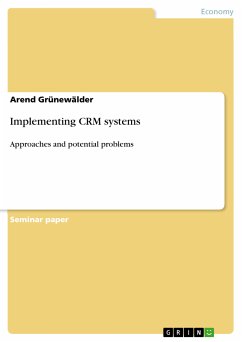Seminar paper from the year 2007 in the subject Business economics - Offline Marketing and Online Marketing, grade: 1,7, University of applied sciences, Munich, course: Customer Relationship Management, language: English, abstract: Investing in information technology without relevant questions or a plan for application can lead to the development of a very expensive toy that offers no return on investment. While the planning and implementation of the CRM projects are examined in this work, potential organisational problems and barriers in the attitude of involved employees are analyzed for each implementation phase. The foundation of an accurate CRM implementation is the adoption of a firm’s strategy that should be designed to optimize both profitability and customer satisfaction. Many organisations today have discovered it is a mistake to think about Customer Relationship Management (CRM) systems exclusively in technological terms. A customer focus without accurate information is similar to attempting to circumnavigate the planet without a map.1 Investing in information technology without relevant questions or a plan for application can lead to the development of a very expensive toy that offers no return on investment. While the planning and implementation of the CRM projects are examined in this work, potential organisational problems and barriers in the attitude of involved employees are analyzed for each implementation phase. The foundation of an accurate CRM implementation is the adoption of a firm’s strategy that should be designed to optimize both profitability and customer satisfaction. To realize CRM, organisations must foster behaviours and implement processes and technologies which support coordinated customer interactions throughout all customer channels. In order to achieve this, organisations must develop the strategic and functional components of the CRM projects. The implementation of a CRM strategy is a series of small projects. These projects are all identified when the strategy is defined, and they normally fall into the categories: developing a strategy, implementing operational and analytical projects. If this is not done accurately and/or there is lack of management understanding and commitment, the organisation can be exposed to problems such as retention of employees or data quality problems. The organisation is thus not in a position to initiate the desired customer relationship and to increase revenues while at the same time reducing costs.









